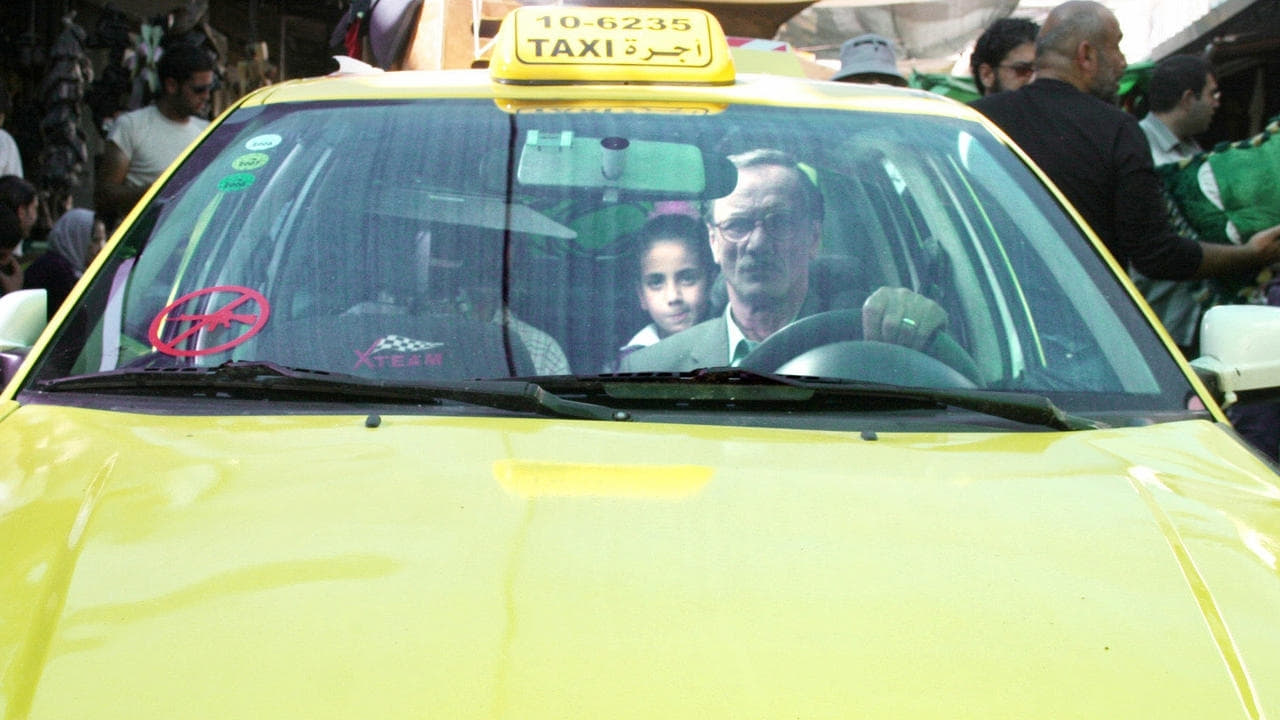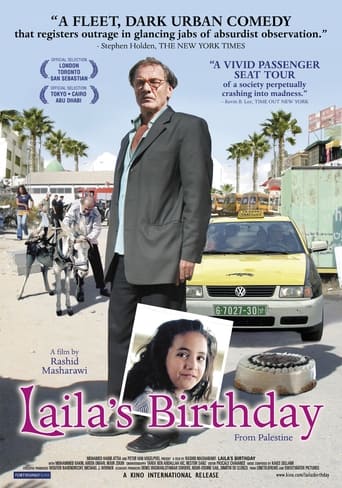

With a running time of just sixty-nine minutes, "Laila's Birthday" chronicles a day in the life of a Palestinian cab driver (a day that also happens to be his daughter's seventh birthday). Abu Laila is actually a former judge who, due to budget cuts, is now forced to drive a taxi, owned by his brother-in-law, to support his wife and child. The "plot" of the movie consists of little more than a series of deliberately undramatic and wryly humorous vignettes revolving around Abu and the cross section of humanity that passes through his cab that day. His passengers include a just-paroled ex-con, an amorous young couple looking for a place to be alone, a woman on her way to the cemetery and the hospital, and another woman whose husband has just been killed in a car bombing.As conceived by writer/director Rashid Masharawi and embodied by the finely stoic and deadpan actor, Mohammed Bakri, Abu is remarkably reticent for a central character - one who rarely articulates his thoughts about the people and events taking place around him. Yet, one senses in the man an undercurrent of frustration arising from having to live in an occupied territory – the West Bank city of Ramallah – a frustration that Abu finally gives vent to in the closing moments of the story. Otherwise, the movie doesn't push its political points and doesn't go for grand dramatic gestures and themes. It merely observes daily life as this one man witnesses it, finding humor in some of the unlikeliest of places.Despite the lack of drama in the situations themselves, there's something strangely hypnotic in Abu's continual cruising through the city and around the countryside, and in his interactions with the various people who come his way.
... View MoreAt first glance, steely-eyed, well-dressed Abu Laila (Mohamed Bakri) hardly looks or talks like a taxi driver. Later, it turns out that the occupation only slightly befits him; a former judge who resorts to driving cabs for a living after the government failed to pay his judicial wages, the protagonist of Rashid Masharawi's "Laila's Birthday" cuts a figure of world-weary austerity. He dismisses a young couple who plan to dally in the back seat, reprimands passengers who neglect to fasten their seat belts and refuses to drive anywhere near a military checkpoint. Abu Laila's harrowing journey begins in the early hours of the morning and continues until the evening, as does the film itself.Set in Ramallah, the Palestinian city on the West Bank and de facto capital of the Palestinian National Authority, "Laila's Birthday" follows its protagonist as he navigates through a regular day on the job, encountering a myriad of different people and situations—except the day in question actually marks a special occasion. His daughter Laila (Nour Zoubi) is celebrating her seventh birthday, and Abu Laila promises to return home in a timely fashion with candles and cake, heeding the words of his wife (Areen Omari): "Listen to me. Interior problems, exterior problems, problems from the occupation it's your daughter's birthday tonight, okay?" Acknowledging her with a half-smile, Abu Laila drives away, ostensibly unaware of the absurd day that lies ahead of him.The film chronicles a series of well-timed incidents between the driver and his passengers, many in comical fashion. Teenagers with weapons are refused service; a young man, fresh out of an 11-year term in prison, accidentally leaves his cell phone behind; Abu Laila takes the item to the police station, where he is subjected to excessive questioning. En route to returning the phone to its owner, Abu Laila's taxi breaks down and a missile detonates somewhere nearby. By the time chaos has ensued on the streets of Ramallah (though its residents do not seem to bat an eye), the protagonist has run out of patience both at the city's sociopolitical problems and the routine disorder that results from it. Only a much- needed return to the comforts of home and an intimate celebration of his daughter's birthday can restore some peace to Abu Laila, who realizes that the rules he adheres to seem to mean little to the people in the world around him.Both a fascinating character study and trenchant social commentary, "Laila's Birthday" creates a remarkably nuanced portrait of a city in turmoil through small but significant vignettes. Gaza-born writer-director Rashid Masharawi, whose previous credits include Cannes hits "Curfew" (1994) and "Haifa" (1996), orchestrates the ordeal with admirable sensitivity. Lead actor Mohamed Bakri plays the role of Abu Laila with impressive gravitas, instilling the plot with a balance of grim pensiveness and dry humor that reveals as much as it enlightens.
... View MorePalestinian director Rashid Mashrawi's film Laila's birthday is a film about the harsh realities of occupied Palestine.The theme of his film concerns emotional upheavals of ordinary people who are nothing but ordinary citizens of a nation which is continually at war.They are troubled in their daily existence by their own intricate idiosyncrasies.We can all easily relate to the pains of our film's protagonist, a taxi driver with his own set of principles who worked as a judge in the past. It is only under dire situations that a judge would be compelled to earn living as a cab driver.The mood of the film is both sombre as well as comic. This is a film for all people with families and children as its teaches values which are important for the society as a whole. Laila's birthday can be summarized as a funny chaotic day in the life of a simple minded taxi driver. It is a feel good film whose end can be easily predicted. A thing which might irk certain sections of viewers involves silly Israel bashing by Rashid Mashrawi as he indulges in it every now and then.
... View MoreI saw this as part of the Palestinian Film Festival 2009 at the Barbican in London. Definitely a must-see, strangely feel-good movie made in a place that disgraces both the west and the UN, sanctimoniously pledged as they are to 'right wrongs wherever they occur'.The film shows the everyday difficulties, obstacles and tragedies of life in the occupied West Bank (NB occupied by the Israelis, against all international laws and norms, since 1967) and the resilience of its protagonist, Abu Laila, on the day of his daughter's birthday.This rather formal and uptight man, trained and originally working as a judge, is now reduced to temping as a taxi-driver with his brother-in-law's car. His day takes him on a journey through Ramallah where he bumps against both the commonplace and the extraordinary: A couple of young lovers want him to drive them - anywhere - round the town so they can progress their love-affair. The injustices at the justice ministry he visits to get his old job back, redecorated and having new curtains for the umpteenth time as a new government comes in. An old woman who must go to the hospital and the cemetery - but she can't decide in which order. A man wounded in an Israeli missile attack - who subsequently dies - is taken to a hospital by the mechanic repairing Abu Laila's taxi when it conks out. The increasingly hapless driver - drinking a coffee round the corner when the missile strikes, finds car and mechanic gone - then has to go to the hospital and even take home the man's grieving but silent female relative. All the while a guy who had earlier left his mobile in the car, continues to ring in, more and more aggressively, demanding Abu Laila bring it back.In a post screening talk, the famous Palestinian actor playing Abu Laila, Mohammed Bakri, made the point that the film is not only about the responsibility of the Israelis for the life that Palestinians lead in the West Bank and Gaza, but that Palestinians have to take some of their own responsibility. They can't blame everything on the occupation.However, there's blame and blame, and once Bakri got going in the discussion, it was clear that whatever he claimed the film to be saying, he (and probably the director) still see the occupation as the central factor. After all, why should the oppressed behave any more morally than the free? In the penultimate and powerful scene, a helicopter circles overhead and Abu Laila finally blows his top at the whole crazy world there. But it is still his daughter's birthday. And he has yet to go home...
... View More